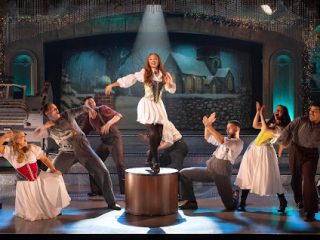Any theatre person knows that our field teaches a host of diverse skills-creative problem-solving, collaboration, communication, critical analysis, and empathy chief among them. What may be less obvious is how to translate those skills to other jobs outside of the arts, which is what many people with degrees in theatre do. In this blog, I’ll look at just some of the non-theatrical career paths for anyone with a theatrical skill set.
Teaching
The obvious path here is to teach theatre, either as a private instructor or for a performing arts organization, but the communication skills required of theatre can also translate to teaching in general. If you’re comfortable in front of people, you can also consider a career in instructional design or corporate training. “Eek, but that’s public speaking!”. Think of it as a role! I have a “teacher self” that I switch on when I’m teaching. In a lot of ways, it feels like performing, just without the cool costumes.
Customer Service
Creatives tend to be good problem-solvers, and customer service often calls for creative problem-solving under pressure. There’s also a performative aspect to customer service that actors may find easy to slip into. After all, you have to adjust your style depending on who you’re talking to, not unlike playing different roles. Finally, customer service jobs tend to offer some flexibility that still allows for theatre work. If there’s a large concert venue or arena near you, look out for jobs as bartenders, concession workers, or front-of-house staff.

Similarly, you could put your skills to work as a tour guide at a college campus or a museum, especially if you also have some teaching experience.
Event Management
If you’re especially skilled in the technical side of theatre, you can use your ability to organize, think quickly on your feet, and manage lots of moving parts in event planning or event management. You could freelance as an event planner, or, if you want more stable employment, work full-time for a company. Plenty of organizations, from colleges and universities to corporations, employ event or facility managers. Need something a little more flexible? Those same companies may hire part-time assistants who only work during events.
Real Estate
A job in real estate combines the ability to memorize with on-stage skills. Broadway actor Don Darryl Rivera pivoted to real estate when theatres shut down during the COVID-19 pandemic. Rivera describes how working as a real estate agent flexes the same memorization ability as learning lines, but instead of dialogue and lyrics, it’s memorizing information about houses. And preparing a home to show off to potential buyers calls for a designer’s eye. After all, an empty home is basically an empty stage.
Nonprofits
The nonprofit sector is full of job opportunities that put theatre skills to work. If you’re a creative, strategic thinker good at communications, a career in development (fundraising) or marketing/public relations might be your ticket. You can also work for a nonprofit arts organization in the box office or front of house. Larger organizations might even have literary departments that employ readers to select new plays for development. If you’re a people person with a heart for service, community outreach work might also be a good fit.
Graphic Design
If you’re a designer (or a performer with artistic skills), think about putting your talent to use doing graphic design or artistic work. Companies often hire people with design skills for marketing campaigns or social media posts. If you want to go the freelance route, you can offer your services on websites like Upwork and Fiverr. You can also harness the power of websites like Etsy to sell your original work.
Activities Director
Merge your people and movement skills in a job planning and running activities. There are all kinds of places that use activities directors—community recreation centers, nursing homes, and cruise ships are some of the most common.

Activities directors are generally responsible for planning and hosting recreational activities for groups of people. Those activities vary based on the group, but they usually involve some sort of physical activity and maybe some games. This could be a great chance to put your sense of fun and knowledge of theatre games to work.
Theatre degrees are notorious for being “unmarketable”, but I’ve never bought into that. Think about all the different skills theatre teaches: creativity, collaboration, communication, time-pressured problem-solving…I’ve only covered some of the jobs that use those skills. It may take ingenuity to overcome some of the stigma in the job market, but if there’s one thing theatre people also know how to do, it’s persevere.















2 comments
Do you have any articles/advice about burnout? My daughter has a prominent ensemble/understudy role in a successful Broadway show that has been running 8 shows a week for almost 2.5 years. She’s an amazing and talented performer. She texted me, very pissed off, that she’s drained, feeling exploited, and can’t wait to “get the hell out.”
I know how she feels, having worked in the film industry for years with long hours, low pay, and exhaustion. I want to support her, but also want to help her to keep her cool, and not burn bridges. Help!
Thanks for reaching out. Our post on self-care and exhaustion might help!
https://blog.stageagent.com/i-wish-i-knew-self-care-with-artist-and-healer-allison-strickland/